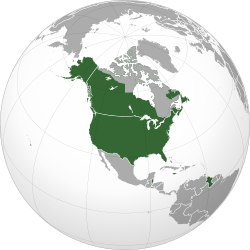 | |
| Regions with significant populations | |
|---|---|
| 271,528,353 (2019) [1] | |
| 22,162,865 (2016) [2] | |
| Languages | |
| English | |
| Religion | |
| Traditionally Protestant Christianity | |
Anglo-Americans are a demographic group in Anglo-America. It typically refers to the predominantly European-descent nations and ethnic groups in the Americas that speak English as a native language, making up the majority of people in the world who speak English as a first language.